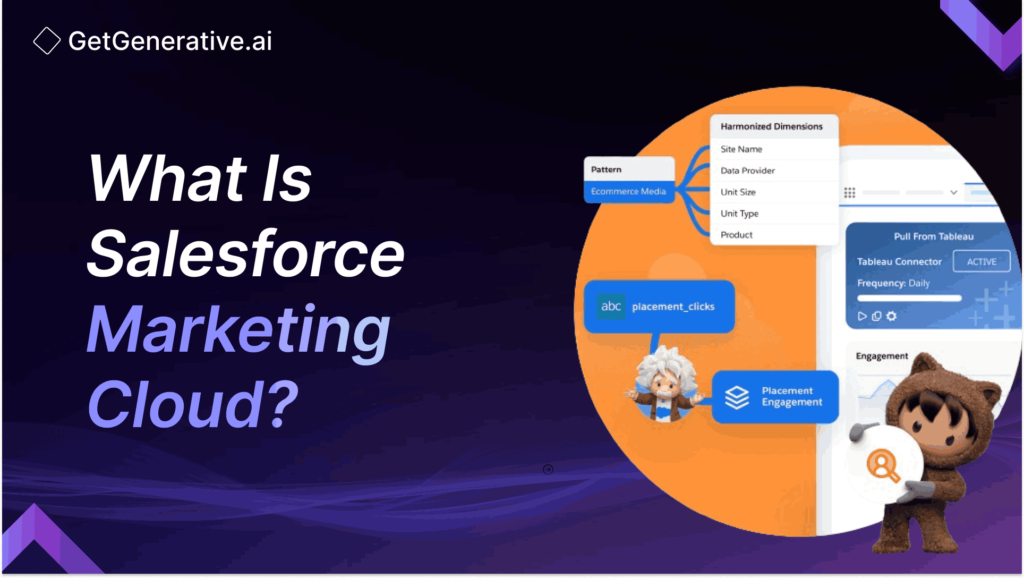What Is Salesforce Marketing Cloud?
Salesforce Marketing Cloud is a comprehensive digital marketing platform designed to help businesses create and manage personalized, multi-channel marketing campaigns. It provides tools that enable marketers to engage with customers across various touchpoints, including email, social media, mobile, and the web.
By leveraging customer data and artificial intelligence, Salesforce Marketing Cloud empowers businesses to deliver targeted, timely, and relevant content to their audience, ultimately driving growth and customer loyalty.
Key Features and Components
Salesforce Marketing Cloud offers a comprehensive suite of tools designed to cover all aspects of digital marketing. Let’s delve deeper into each key feature and component:
Email Studio:
- Drag-and-drop email builder for creating visually appealing messages
- Dynamic content blocks for personalization
- A/B testing capabilities to optimize email performance
- Automated send-time optimization
- Advanced segmentation for targeted campaigns
- Real-time tracking and analytics for open rates, click-throughs, and conversions
Journey Builder:
- Visual canvas for mapping out complex, multi-channel customer journeys
- Trigger-based automation for timely communications
- Integration with CRM data for personalized journeys
- Decision splits based on customer behavior or attributes
- Multi-channel orchestration (email, SMS, push notifications, ads)
- Real-time journey analytics and optimization tools
Social Studio:
- Social media listening across major platforms (Facebook, Twitter, Instagram, LinkedIn)
- Content calendar for planning and scheduling posts
- Engagement tools for responding to comments and messages
- Social media analytics and reporting
- Influencer identification and tracking
- Crisis management and alert system
Mobile Studio:
- SMS campaign creation and management
- Push notification services for mobile apps
- Location-based marketing capabilities
- Mobile app messaging
- Integration with Journey Builder for cross-channel campaigns
- Mobile-specific analytics and performance tracking
Advertising Studio:
- Audience segmentation for targeted ad campaigns
- Integration with major ad platforms (Google Ads, Facebook Ads, Instagram Ads)
- Lookalike audience creation
- Lead capture and integration with CRM
- Cross-channel ad performance tracking
- Automated budget optimization
Personalization Builder:
- AI-powered product recommendations
- Dynamic content insertion in emails and web pages
- Behavioral targeting based on browsing and purchase history
- Predictive intelligence for next best offers
- Real-time personalization across channels
- A/B testing for personalization strategies
Interaction Studio:
- Real-time customer interaction tracking across web, mobile, and offline channels
- Visual customer journey mapping
- Next-best-action recommendations
- Personalized web experiences
- Cross-channel behavioral analytics
- Integration with other Salesforce clouds for a unified customer view
Datorama:
- Automated data integration from multiple marketing sources
- AI-powered insights and anomaly detection
- Customizable dashboards and reporting
- Marketing performance optimization
- ROI analysis and budget pacing
- Goal setting and tracking across campaigns and channels
These features and components work together seamlessly within the Salesforce Marketing Cloud ecosystem, allowing marketers to create highly targeted, personalized, and effective marketing campaigns across multiple channels. By leveraging these tools, businesses can improve customer engagement, increase conversion rates, and drive overall marketing performance.
Also Read – Salesforce Marketing Cloud Consultant: A Complete Guide
How does Salesforce Marketing Cloud integrate with other Salesforce tools?
Salesforce Marketing Cloud seamlessly integrates with other Salesforce products, creating a unified ecosystem for customer relationship management:
- Sales Cloud: Share customer data and insights between marketing and sales teams.
- Service Cloud: Provide customer service representatives with a holistic view of customer interactions.
- Commerce Cloud: Personalize e-commerce experiences based on marketing data.
- Salesforce CRM: Sync customer data across all platforms for a 360-degree customer view.
This integration allows for a cohesive customer experience and more effective cross-functional collaboration within organizations.
What are the key benefits of using Salesforce Marketing Cloud for small businesses?
Small businesses can greatly benefit from Salesforce Marketing Cloud:
- Scalability: Grow your marketing efforts as your business expands.
- Cost-effectiveness: Consolidate multiple marketing tools into one platform.
- Time-saving automation: Streamline repetitive tasks and campaign management.
- Data-driven decision making: Gain insights from analytics to optimize marketing strategies.
- Personalization at scale: Deliver tailored customer experiences without a large marketing team.
- Improved customer engagement: Reach customers across multiple channels effectively.
Can Salesforce Marketing Cloud help improve customer loyalty?
Yes, Salesforce Marketing Cloud can significantly contribute to improving customer loyalty:
- Personalized communications: Deliver relevant content based on customer preferences and behavior.
- Timely engagement: Reach out to customers immediately with automated journeys.
- Consistent experiences: Maintain a unified brand voice across all channels.
- Predictive insights: Anticipate customer needs and provide proactive support.
- Loyalty program management: Create and manage rewards programs within the platform.
By leveraging these capabilities, businesses can foster stronger customer relationships, leading to increased loyalty and retention.
Also Read – Salesforce Marketing Cloud Implementation Guide
How does the AI in Salesforce Marketing Cloud enhance marketing strategies?
Artificial Intelligence plays a crucial role in Salesforce Marketing Cloud:
- Predictive analytics: Forecast customer behavior and campaign performance.
- Automated segmentation: Create dynamic customer segments based on AI-driven insights.
- Smart content creation: Generate AI-powered subject lines and content recommendations.
- Optimal send-time prediction: Determine the best time to send messages to individual customers.
- Personalized product recommendations: Suggest relevant products based on customer behavior and preferences.
- Intelligent audience building: Identify look-alike audiences for targeted acquisition campaigns.
These AI-powered features enable marketers to create more effective, data-driven strategies that resonate with their audience.
What are the main components of Salesforce Marketing Cloud?
The main components of Salesforce Marketing Cloud include:
- Marketing Cloud Account Engagement (formerly Pardot): B2B marketing automation.
- Marketing Cloud Engagement (core platform): Multi-channel marketing campaigns.
- Marketing Cloud Personalization (formerly Interaction Studio): Real-time personalization.
- Marketing Cloud Customer Data Platform: Unified customer data management.
- Marketing Cloud Intelligence (formerly Datorama): Marketing analytics and reporting.
- Salesforce CDP: Customer data platform for unified profiles.
These components work together to provide a comprehensive marketing solution for businesses of all sizes.
Also Read – Salesforce Marketing Cloud Account Engagement Consultant
Conclusion
Salesforce Marketing Cloud is a powerful platform that enables businesses to create personalized, data-driven marketing strategies across multiple channels. Leveraging AI, automation, and integration with other Salesforce tools helps companies of all sizes improve customer engagement, loyalty, and overall marketing effectiveness.
Enhance your Salesforce consulting with GetGenerative.ai. Effortlessly craft outstanding proposals, enabling you to dedicate more time to providing exceptional client service.
Start today!
Frequently Asked Questions (FAQs)
1. Is Salesforce Marketing Cloud suitable for small businesses?
Yes, it offers scalable solutions that can grow with your business.
2. Can I integrate Salesforce Marketing Cloud with non-Salesforce tools?
Yes, it supports integration with various third-party applications and data sources.
3. How does Salesforce Marketing Cloud ensure data privacy and compliance?
It provides features for data management, consent tracking, and compliance with regulations like GDPR and CCPA.
4. Is technical expertise required to use Salesforce Marketing Cloud?
While some technical knowledge is beneficial, Salesforce offers user-friendly interfaces and extensive training resources.




